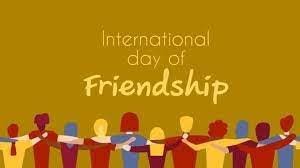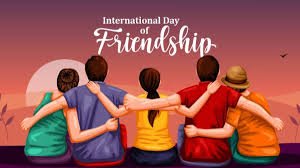International Day of Friendship 2024 – Fostering Global Unity
Introduction: Celebrating Global Bonds
The International Day of Friendship 2024, observed on July 30th, emphasizes the importance of building bridges between communities and nations. Established by the United Nations General Assembly in 2011, this day encourages fostering friendly relations across borders, promoting peace and understanding.
Significance of the Day
The day is a platform for encouraging dialogue among people of different cultures and backgrounds. It highlights the value of mutual respect and empathy in overcoming conflicts and fostering global harmony. Events and activities worldwide focus on celebrating diversity and encouraging collective efforts toward global peace.
Global Celebrations and Initiatives
Various countries and organizations participate in the International Day of Friendship through numerous events. These include cultural exchanges, community service, and educational programs aimed at strengthening international relationships. Notable initiatives this year include cross-cultural workshops and virtual meetups that bring together individuals from diverse backgrounds to discuss and promote mutual understanding.
Impact on Global Diplomacy
The International Day of Friendship also plays a role in international diplomacy by highlighting the need for collaborative efforts to address global challenges. It reinforces the idea that building strong, friendly relationships can lead to more effective solutions for issues such as climate change, poverty, and conflict resolution.
Future Prospects
Looking ahead, the International Day of Friendship aims to continue fostering a global culture of peace and cooperation. Future activities will likely include expanded international collaborations and increased emphasis on youth involvement in promoting cross-cultural understanding.

Why This News is Important
Promoting Global Unity
The International Day of Friendship serves as a crucial reminder of the importance of unity and cooperation among nations. By celebrating this day, individuals and communities around the world are encouraged to engage in activities that promote international understanding and harmony. This aligns with the UN’s broader goals of fostering peaceful relations and addressing global issues collectively.
Strengthening Diplomatic Relations
This observance plays a significant role in diplomatic relations by encouraging dialogue and collaboration between countries. Through various events and initiatives, nations can strengthen their partnerships and work together to tackle global challenges, thus contributing to a more stable and cooperative international environment.
Enhancing Cultural Exchange
By highlighting the value of cultural exchange, the International Day of Friendship promotes a deeper appreciation of diverse cultures. This cultural exchange fosters mutual respect and helps break down stereotypes, contributing to a more inclusive and tolerant world.
Encouraging Community Involvement
The day also serves to inspire community involvement and volunteerism. Local events and activities provide opportunities for individuals to contribute to their communities while also supporting broader international goals of peace and cooperation.
Supporting Educational Initiatives
Educational programs and workshops organized for this day help raise awareness about global issues and the importance of friendship and collaboration. These initiatives contribute to building a more informed and engaged global citizenry, essential for addressing future challenges.
Historical Context
Origins of the International Day of Friendship
The International Day of Friendship was established by the United Nations General Assembly in 2011, following a proposal by Paraguay. The aim was to promote the idea of friendship between peoples, countries, and cultures as a means to foster peace and mutual understanding.
Previous Observances
Since its inception, the day has been marked by various events worldwide, including cultural festivals, educational programs, and community service projects. These observances have highlighted different aspects of international friendship and cooperation, contributing to ongoing global dialogue and partnerships.
Relation to UN Goals
The day aligns with the UN’s broader objectives, including the promotion of peace, security, and development. It complements other international observances focused on similar themes, such as the International Day of Peace and the International Youth Day, by emphasizing the role of friendship in achieving these goals.
Recent Developments
In recent years, the International Day of Friendship has gained increased recognition and participation from various sectors, including governments, NGOs, and educational institutions. This growing engagement reflects a broader commitment to addressing global challenges through collaborative efforts and mutual respect.
Key Takeaways from International Day of Friendship 2024
| Serial Number | Key Takeaway |
|---|---|
| 1 | The International Day of Friendship is observed annually on July 30th to promote global unity and mutual understanding. |
| 2 | Established by the UN in 2011, the day encourages dialogue and collaboration between diverse cultures and nations. |
| 3 | Celebrations include cultural exchanges, community service, and educational programs that foster international relations. |
| 4 | The day supports diplomatic efforts and highlights the importance of friendly relations in addressing global challenges. |
| 5 | Future observances aim to expand international collaborations and enhance youth involvement in promoting global peace. |
Important FAQs for Students from this News
1. What is the International Day of Friendship?
The International Day of Friendship is a United Nations observance held annually on July 30th to promote international understanding and unity. It encourages fostering friendly relations between people of different cultures and backgrounds.
2. When was the International Day of Friendship established?
The International Day of Friendship was established by the United Nations General Assembly in 2011.
3. What are the main goals of the International Day of Friendship?
The primary goals are to promote mutual respect and understanding, enhance cultural exchanges, and support global diplomacy through friendly relations among nations.
4. How is the International Day of Friendship celebrated?
The day is celebrated through various events such as cultural exchanges, community service projects, and educational programs aimed at strengthening international relationships and promoting peace.
5. Why is the International Day of Friendship important for global diplomacy?
It plays a key role in fostering diplomatic relations by encouraging dialogue and cooperation between nations, which can help address global challenges and promote a more stable international environment.
Some Important Current Affairs Links
















